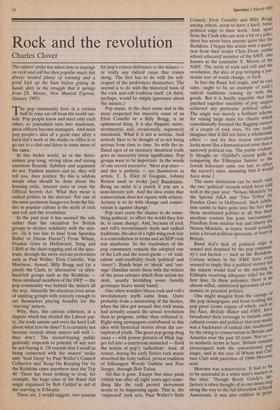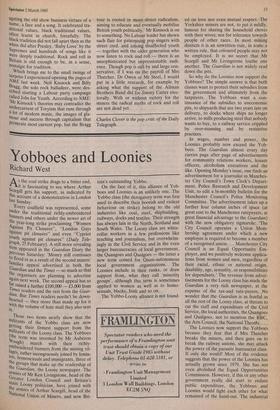Rock and the revolution
Charles Clover
The miners' strike has taken time to impinge on rock and roll but then popular music has always needed plenty of warning and a good kick up the bum before getting its hands dirty in the struggle that it springs from (X. Moore, New Musical Express, January 1985).
The pop community lives in a curious he zone cut off from the world out- Side. Pop people know and meet only each other; so journalists turn into musicians, press officers become managers. And most pop people's idea of a good time after a hard day's work at the studio or office is to go out to a club and listen to some more of the same.
In this bedsit world, as in the three- minute pop song, strong ideas and strong emotions flourish. Subtlety and argument do not. Fashion matters and so, they will tell you, does politics. By this is seldom meant what should be done about the housing crisis, interest rates or even the Official Secrets Act. What they mean is radical politics in the abstract. For one of the most persistent hangovers from the Six- ties in popular culture is the myth of rock and roll and the revolution.
In the past year it has seemed the rule rather than the exception for British. groups to declare solidarity with the min- ers. (Is it too late to hear from Spandau Ballet or Duran Duran?) From Wham, Frankie Goes to Hollywood, Sting and UB40 at the chart-topping end of the spec- trum, through the more serious performers such as Paul Weller, Elvis Costello, Van Morrison, Aswad, Billy Bragg and (at a pinch) the Clash, to 'alternative' or ultra- hard-left groups such as the Redskins — three skinhead members of the SWP — the pop community was behind the miners all the way. Absurdly the situation even arose of aspiring groups with scarcely enough to eat themselves playing benefits for the 'starving' miners.
Why, then, this curious cohesion, in a dispute which has divided the Labour par- ty, the trade unions and even the hard Left about what is to be done? It is certainly not because records about miners sell well — they don't. The record-buying public generally responds to polemic of any sort by not buying it. Of records that I recall as being connected with the miners' strike only 'Soul Deep' by Paul Weller's Council Collective and 'Keep On Keeping On' by the Redskins came anywhere near the Top 40. There has been nothing to rival, for example, the huge sales of the Band Aid single organised by Bob Geldof in aid of the starving in Ethiopia.
There are, I would suggest, two reasons for pop's craven deference to the miners — or really any radical cause that comes along. The first has to do with the self- respect of the performers themselves. The second is to do with the historical basis of the rock and roll tradition itself. (A third, perhaps, would be simple ignorance about the miners.) Pop music, in the chart sense and in the more respected but minority sense of an Elvis Costello or a Billy Bragg, is an ephemeral thing. It is also flippant, naive, sentimental, and, occasionally, supremely emotional. What it is not is serious. And nobody likes to be thought of as not being serious from time to time. So with the in- flated egos of an intensely theatrical trade goes an insecurity about significance. Pop groups want to be important. In the words of one record executive: 'Most pop stars — and this is pathetic — see themselves as artists: T. S. Eliot or Gauguin. Johnny Rotten used to evoke [sic] Baudelaire. Being an artist is a crutch if you are a semi-literate yob. And the idea exists that conservatism does not equate with artistry. Artistry is to do with change and conser- vatism is against change.'
Pop stars crave the chance to do some- thing political, to affect the world they live in, to cause change. And, because of rock and roll's revolutionary myth and radical traditions, the idea of a right-wing rock star is a contradiction in terms and an SDP rock star anathema. So the vocabulary of the pop community remains the adopted one of the Left and the avant-garde — of `radi- calism' and credibility (both 'political' and `street'). Bands hope to 'shock' and 'out- rage' (familiar terms these with the writers of the press releases which float across my desk, usually heralding some banally grotesque heavy metal band). .
One often wonders where rock and roll's revolutionary myth came from. Quite probably from a misreading of the Sixties, when the idea got around that rock music had actually caused the sexual revolution then in progress, rather than reflected it. Right-wing newspapers contributed to this idea with hysterical stories about the cor- ruption of youth. The great pop group drug cases — with potent pictures of Mick Jag- ger led into a courtroom manacled — fired the notion of pop's `radicalism'. And, of course, during the early Sixties rock music absorbed the truly radical, protest tradition of folksingers Woody Guthrie and Pete Seeger, through Bob Dylan.
All that is gone. Except that since punk (which was after all eight years ago) some- thing like the rock protest movement seems to be happening again. That is, the 'respected' rock acts, Paul Weller's Style • Council, Elvis Costello and Billy Bragg among others, seem to have a hard, bitter political edge to their work. And, apart from the Clash who are now a bit of a joke, there has never been anyone quite like the Redskins. I began this article with a quota- tion from their leader Chris Dean, public school educated member of the SWP, also known as the journalist X. Moore of the NME. The myth of rock and roll and the revolution, the idea of pop bringing a par- ticular sort of social change, is back. In fact the Band Aid single, and its vast sales, ought to be an example of rock's radical traditions coming up with the goods. But it is hardly arguable that this patched together assembly of pop singers achieved any particular political effect. The single was merely a brilliant scheme for raising large sums for charity which coincidentally boosted the flagging careers of a couple of rock stars. No one really imagines that it did not have a wholesome effect — and for that reason starvation looks more like a humanitarian issue than a narrowly political one. The public evident- ly thought so. (Geldofs recent gaffe of comparing the Ethiopian famine to the Jewish holocaust came too late to affect the record's sales, assuming that it would have done.) The same distinction can be made with the two 'political' records which have sold well in the past year: 'Nelson Mandela' by the Special AKA and `Two Tribes' by Frankie Goes to Hollywood. Such jubila- tion seems to have gone into the fact that these mentioned politics at all that their anodyne content has gone unexamined. Freedom from nuclear war and liberty for Nelson Mandela, as issues, would actually unite a broad political spectrum, at least in Britain. Band Aid's lack of political edge is sensed and despised by the pop comrnua" ity's red faction — such as the Redskins. Certain writers in the NME have even seemed to imply that a political victorY for the miners would lead to the starving in Ethiopia receiving adequate relief for the first time. In these polemics, there is an almost wilful, embittered ignorance of eco- nomics or practical politics. One might imagine from the sayings ef the pop demagogues and from reading the pop press (some organs of which, such as the Face, Melody Maker and NME, have broadened their coverage to include other cultural events and politics) that pop music was a backwater of radical chic unaffected by the swing to conservatism in Britain and America over the past 10 years. Not so — in aesthetic terms at least. Britain remains preoccupied with the conventional poP single, and in the case of Wham and Cul- ture Club with pastiches of 1960s Motovin soul. Motown was conservative. It had to be to be successful in a white man's market at the time. Though Berry Gordy's hit factory is often thought of as one more step along the way to the full liberation of black Americans, it was also ruthless in prop- agating the old show business virtues of a name, a face and a song. It celebrated tra- ditional values, black traditional values, Often learnt in church, forcefully. The black tradition did not fall apart then as the White did after Presley. 'Baby Love' by the Supremes and hundreds of songs like it Were deeply traditional. Rock and roll in Britain is old enough to be, in a sense, nostalgic for tradition.
Which brings me to the small twinge of surprise I experienced opening the pages of NME last week. Neil Kinnock and Billy Bragg, the solo rock balladeer, were des- cribed starting a Labour party campaign called Jobs for Youth. According to NME: 'Mr Kinnock's theories may contradict the undercurrent of Toryism that runs through a lot of modern music, the images of gla mour and success through capitalism that permeate most current pop, but the Bragg tour is rooted in more direct radicalism, aiming to educate and eventually mobilise British youth politically.' Mr Kinnock is on to something. No Labour leader has shown such flair for patronising pop singers with street cred. and among disaffected youth — together with the older generation who now listen to rock and roll — there is an unsophisticated but impressionable audi- ence. Though pop is still by and large con- servative, if I was on the payroll of Mrs Thatcher, Dr Owen or Mr Steel, I would put in a little research, for example by asking what the support of the Allman Brothers Band did for Jimmy Carter elec- torally. With or without victory for the miners the radical myths of rock and roll are not dead yet.
Charles Clover is the pop critic of the Daily Telegraph.















































 Previous page
Previous page